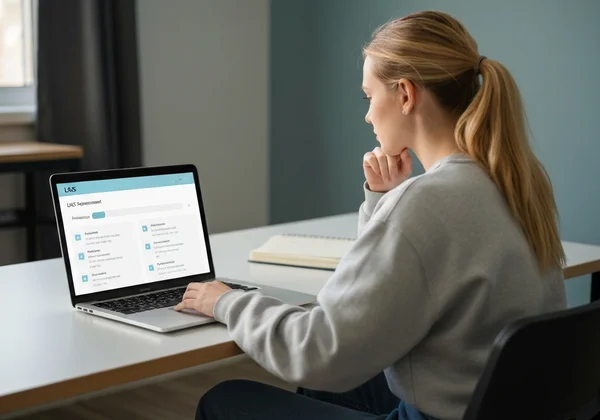LSAS: Navigating Social Anxiety in College & Campus Life
November 13, 2025 | By Elara Donovan
The start of college often brings a whirlwind of emotions: the thrill of independence, exciting new subjects, and the promise of lifelong friendships. Yet, for many, this vibrant new social landscape can quickly become overwhelming. You might find yourself wondering, Do I have social anxiety or am I just shy? Understanding the difference is the first step toward building confidence, and the LSAS (Liebowitz Social Anxiety Scale) is an incredible tool to help you find clarity. If you're ready to understand your social comfort better, you can start your LSAS assessment.
Understanding Student Social Anxiety in College
College life is a unique pressure cooker of academic and social expectations. It’s perfectly normal to feel nervous before a presentation or shy when meeting a new roommate. But sometimes, that nervousness is more than just butterflies; it's a persistent fear that can get in the way of your education and experiences. Let's explore what that looks like on campus.
Shyness vs. Social Anxiety: Recognizing the Difference on Campus
It's easy to confuse shyness with social anxiety, but they are fundamentally different. Shyness is a personality trait. You might feel reserved or take longer to warm up in new social settings, but it doesn't typically cause you significant distress. You can still attend parties or participate in class, even if it feels a little uncomfortable at first.
Social anxiety, also known as social phobia, is more intense. It's a persistent fear of being watched, judged, or embarrassed. This fear can be so powerful that it leads you to avoid social situations altogether. On campus, this might mean skipping classes to avoid presentations, eating alone to dodge the busy dining hall, or turning down invitations to club meetings, ultimately impacting your academic performance and ability to form connections. A social phobia test can offer initial insight into these feelings.

Common College Triggers for Social Anxiety Symptoms
The university environment is filled with situations that can act as campus triggers for social anxiety. Recognizing them is a key part of managing your response. Some of the most common triggers for students include:
- Public Speaking: From class presentations to simply asking a question in a large lecture hall.
- Group Projects: The pressure of collaborating, sharing ideas, and worrying about being judged by peers.
- Casual Interactions: Striking up conversations in the dorm, attending parties, or navigating crowded common areas.
- Authoritative Figures: Meeting with professors during office hours or speaking with academic advisors can be intimidating.
- Eating in Public: The feeling of being watched in a busy cafeteria or student union.
If these scenarios feel less like challenges and more like insurmountable obstacles, it's a sign that exploring your social comfort level could be beneficial.
How the LSAS Empowers Your Campus Journey
Understanding your mental well-being is a powerful and empowering first step. The LSAS for students isn't just a quiz; it's a structured tool designed to give you a clearer picture of what you're experiencing. It helps you move from vague feelings of worry to specific, measurable insights.
What is the LSAS and Its Relevance for College Students?
The LSAS, or Liebowitz Social Anxiety Scale, is a well-respected questionnaire used to gauge the impact of social anxiety. Developed by psychiatrist and researcher Dr. Michael R. Liebowitz, it consists of 24 questions that cover a wide range of social and performance situations you might encounter. For each situation, you'll rate two things: the level of fear you feel and how often you avoid it.
For a college student, this is incredibly relevant. The LSAS asks about things like speaking to people in authority (professors), working while being observed (study groups), and attending social gatherings (campus events). By completing the assessment, you receive a detailed score that helps quantify your experiences, providing a solid foundation for self-awareness. You can take the free LSAS test for free on our platform.

Interpreting Your LSAS Score: A Guide to Your Social Comfort
After completing the 24 questions, you'll receive a total score, as well as separate scores for fear and avoidance. This LSAS scoring system helps you understand not just what you fear, but also how you cope with that fear. A high avoidance score, for example, might explain why you've been turning down social invitations even when you want to connect.
The scores are typically categorized into levels, such as mild, moderate, marked, or severe social anxiety. This isn't a diagnosis but a guide to your personal social comfort level. Understanding your score can be an empowering moment—it validates your feelings and provides a clear starting point for taking proactive steps. An lsas online test is a great way to begin this journey.
Conquering College Presentation Anxiety & Social Engagements
Understanding your social anxiety is the first step; the next is developing strategies to navigate it. College is a time for growth, and that includes building social confidence. Armed with insights from your college presentation anxiety assessment, you can begin to tackle challenging situations head-on.
Strategies for Public Speaking, Group Projects, and Class Participation
Facing academic situations that trigger anxiety can be tough, but certain coping mechanisms can make a significant difference.
-
Prepare and Practice: The more you know your material for a presentation, the less you'll worry about judgment. Practice in front of a mirror, a friend, or even just record yourself.
-
Challenge Negative Thoughts: When your mind says, "Everyone will think I'm incompetent," challenge it. Ask yourself, "Is that really true?" Reframe it to, "I'm well-prepared and can share valuable ideas."
-
Focus Outward: During a presentation or group discussion, shift your focus from your own anxiety to the message you want to convey or the people you're talking to.
-
Start Small: For class participation, set a small goal, like raising your hand just once per class. Each small victory builds momentum.

Building Connections: Navigating Dorm Life, Clubs, and Social Events
Your social life is a huge part of the college experience. Don't let social anxiety keep you from forming meaningful connections. Navigating dorm life and campus events is manageable with a strategic approach.
- Seek Common Interests: Joining a club based on a hobby you genuinely love—like gaming, hiking, or art—puts you in a room with people you already have something in common with. The focus is on the activity, not just socializing.
- Set Realistic Goals: You don't have to be the life of the party. Aim for one meaningful conversation instead of trying to talk to everyone.
- Be a Good Listener: Asking open-ended questions takes the pressure off you to talk and shows others you're interested in them.
- Use the LSAS Insights: If your social anxiety self-assessment revealed a high fear of initiating conversations, practice with low-stakes scenarios, like asking someone in the dining hall about their major.
Your Next Steps Towards a Confident College Experience
Navigating college with social anxiety can feel isolating, but you are not alone. Acknowledging your feelings is the brave first step toward building a more confident and fulfilling campus life. The LSAS provides a private, accessible, and scientifically grounded way to gain that crucial self-awareness. It translates abstract fears into tangible data, giving you a roadmap for personal growth.
Your journey to social comfort starts with a single step. Take the opportunity to understand yourself better. Visit our platform today to take the free LSAS test and receive immediate insights into your social anxiety profile.

Frequently Asked Questions About LSAS and Social Anxiety in College
How can a college student get an LSAS score?
Getting your LSAS score is simple and confidential. You can visit a platform like LSAS online test and take the free, 24-question assessment online. The process is straightforward, requires no registration, and provides you with an instant score and interpretation upon completion.
What LSAS score suggests significant social anxiety for students?
While specific score ranges can vary, generally, higher scores on the LSAS indicate a greater impact of social anxiety. However, it's crucial to view the score as a reference point for your personal experience, not a definitive label. The test helps identify patterns of fear and avoidance that may be causing significant distress in your mental health.
Is the LSAS assessment on LSAS.me anonymous and confidential?
Yes, absolutely. We prioritize your privacy. The LSAS assessment on our platform is completely anonymous and confidential. You are not required to provide any personally identifiable information to take the test and receive your standard score report, ensuring a safe space for self-exploration.
Can LSAS results replace a professional diagnosis for college social anxiety?
No. The LSAS is a valuable screening and self-assessment tool, but it is not a substitute for a professional diagnosis from a qualified healthcare provider, such as a psychologist or psychiatrist. If your results cause you concern, we strongly encourage you to use them as a starting point for a conversation with a campus counselor or another mental health professional.